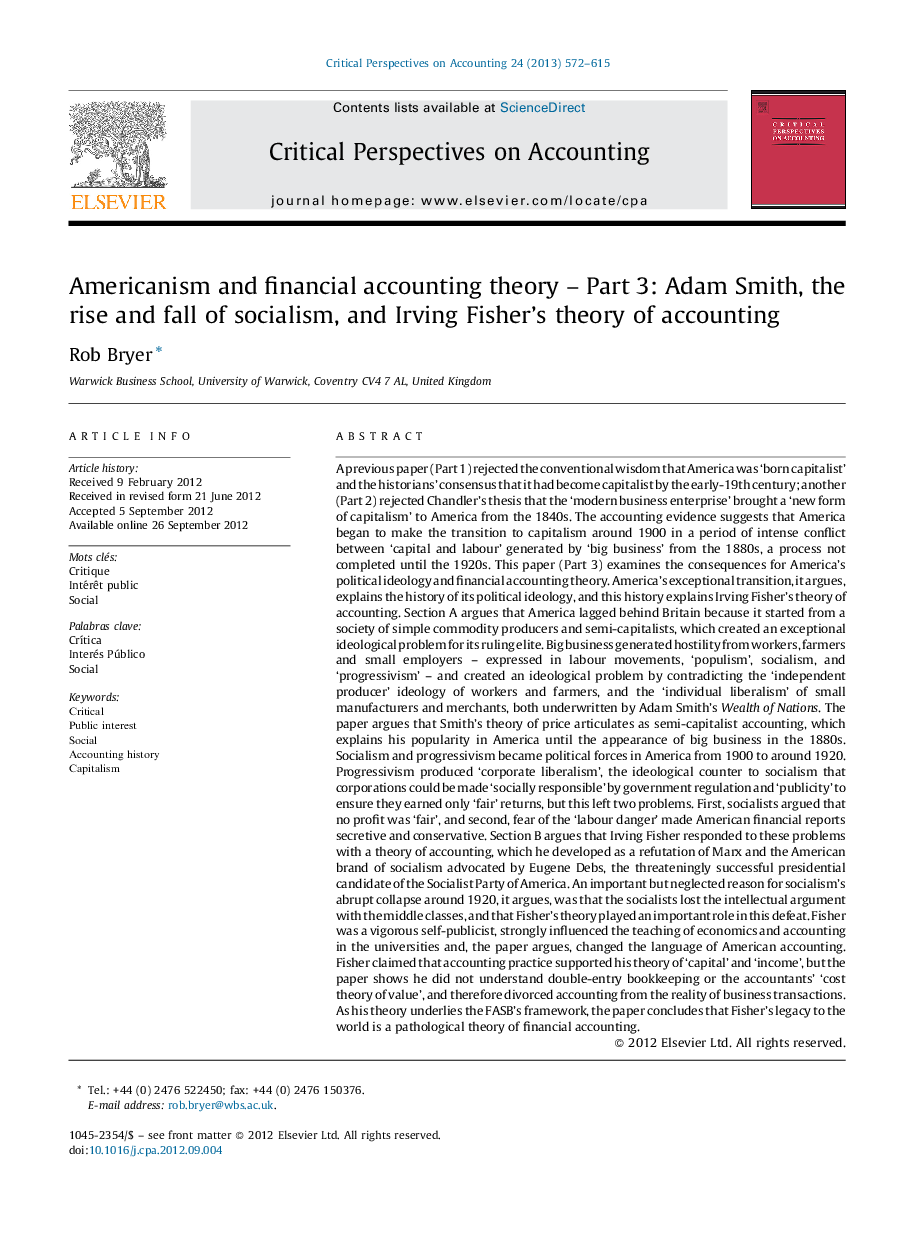| کد مقاله | کد نشریه | سال انتشار | مقاله انگلیسی | نسخه تمام متن |
|---|---|---|---|---|
| 999449 | 1481711 | 2013 | 44 صفحه PDF | دانلود رایگان |

A previous paper (Part 1) rejected the conventional wisdom that America was ‘born capitalist’ and the historians’ consensus that it had become capitalist by the early-19th century; another (Part 2) rejected Chandler's thesis that the ‘modern business enterprise’ brought a ‘new form of capitalism’ to America from the 1840s. The accounting evidence suggests that America began to make the transition to capitalism around 1900 in a period of intense conflict between ‘capital and labour’ generated by ‘big business’ from the 1880s, a process not completed until the 1920s. This paper (Part 3) examines the consequences for America's political ideology and financial accounting theory. America's exceptional transition, it argues, explains the history of its political ideology, and this history explains Irving Fisher's theory of accounting. Section A argues that America lagged behind Britain because it started from a society of simple commodity producers and semi-capitalists, which created an exceptional ideological problem for its ruling elite. Big business generated hostility from workers, farmers and small employers – expressed in labour movements, ‘populism’, socialism, and ‘progressivism’ – and created an ideological problem by contradicting the ‘independent producer’ ideology of workers and farmers, and the ‘individual liberalism’ of small manufacturers and merchants, both underwritten by Adam Smith's Wealth of Nations. The paper argues that Smith's theory of price articulates as semi-capitalist accounting, which explains his popularity in America until the appearance of big business in the 1880s. Socialism and progressivism became political forces in America from 1900 to around 1920. Progressivism produced ‘corporate liberalism’, the ideological counter to socialism that corporations could be made ‘socially responsible’ by government regulation and ‘publicity’ to ensure they earned only ‘fair’ returns, but this left two problems. First, socialists argued that no profit was ‘fair’, and second, fear of the ‘labour danger’ made American financial reports secretive and conservative. Section B argues that Irving Fisher responded to these problems with a theory of accounting, which he developed as a refutation of Marx and the American brand of socialism advocated by Eugene Debs, the threateningly successful presidential candidate of the Socialist Party of America. An important but neglected reason for socialism's abrupt collapse around 1920, it argues, was that the socialists lost the intellectual argument with the middle classes, and that Fisher's theory played an important role in this defeat. Fisher was a vigorous self-publicist, strongly influenced the teaching of economics and accounting in the universities and, the paper argues, changed the language of American accounting. Fisher claimed that accounting practice supported his theory of ‘capital’ and ‘income’, but the paper shows he did not understand double-entry bookkeeping or the accountants’ ‘cost theory of value’, and therefore divorced accounting from the reality of business transactions. As his theory underlies the FASB's framework, the paper concludes that Fisher's legacy to the world is a pathological theory of financial accounting.
► I examine the consequences of America's transition to capitalism for its political ideology and financial accounting theory.
► America's exceptional transition explains the history of its political ideology and Irving Fisher's theory of accounting.
► Adam Smith's theory of price articulates as semi-capitalist accounting, explaining his popularity until the 1880s.
► Fisher responded to the socialist threat with a theory of accounting he developed as a refutation of Marx.
► Fisher did not understand double entry bookkeeping, and his legacy is a pathological theory of financial accounting.
Journal: Critical Perspectives on Accounting - Volume 24, Issues 7–8, November 2013, Pages 572–615